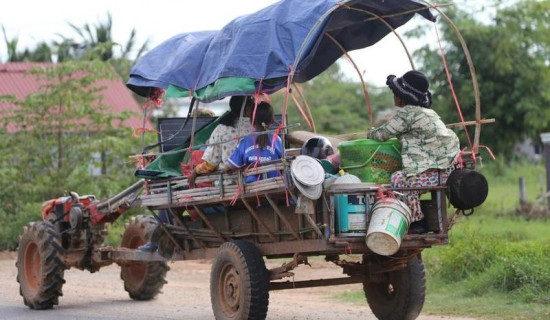- Saturday, 2 August 2025
Pragmatic Politics Trumps Ideology
In his book famous book “Clash of Civilisations and the Remaking of World Order”, Huntington discusses about the emergence and re-emergence of civilisations based on ideological grounds which, to some extent, is believed to have shaped political order reflected in the cleavage between the East and the West. To him, ideology seems to be the griping ground to define the world order, especially the political undercurrents of time. However, historian Francis Fukuyama, argues that ideological debate between left and right or socialism versus capitalism does not seem to pertain any longer at the time when the world is machined by the economic growth and prosperity, technological transfer and globalisation disbanding the ideological wars that persisted till the 1970s. The wake of the 80s, according to him, is the age of innovation in which ideologies get submerged and economy takes on.
In the same vein, the Indian thinker Guru Charan Das contends views that the year 1991 marked the advent of liberalisation: the need for institutionalisation of governance and stabilising economic enhancement through incapacitating state machineries so as to reap fruits for the grassroots public. He laments the fact that the Indian democracy, above all, did not work on this model and did not cherish the fruits as desired. Even the writer like Fareed Zakaria agrees the point that ideological notion of democracy is on the constant wane -- when the countries are plagued by lack of governance, rational distribution of resources to the grassroots public, and rampant corruption.
Paradigm shift
Apparently, we can see the changing dynamics of times. The past took us into ideological fold and the concept of economy and technology were not as pivotal as they are today. The case of present time, however, is slightly different: now is the time for the quest for economic surge, putting aside the ideology until you get your economy into track. We can take an example of the USA and China. The two superpowers whose ideological grounds are completely different and have diverse issues in many global affairs need to come to the point of economic accord.
But economy brings them to some conciliatory ground. Since they have to manage their economy and settle it, they seem to be engaged in dialogues to dissolve issues of trade wars and others. Today's world rests on economy unlike past in which a country would be powerful because of the number of warplanes, armies, and war strategies. The Great Britain whose influence persisted for a couple centuries was because of economic influence backed up by military power.
On this backdrop, we find rosy days of ism and glorious political ideology begin to flounder. Instead, the countries are questing of pragmatic implementation of the state mechanism to deal with persisting problems. They are focusing on institutional management, resource mobilisation, equal distribution of resources, and sustainable development through grassroots participation. The socialistic movement have suffered a setback while the democratic practices, believed to be panacea for social and political cure, now seem towards slanting glide because they don’t cope with the challenges. We can see the biggest democracy India sweltered by poverty, lack of participation, inequality of resource distribution, poverty.
After the 1990s, the era of quest for development, new order, technology, and economic priority showed its domain in the world. Democracy, too, did not become as inclusive as it should be and grassroots people kept on being marginalised and deprived. The unprecedented level of corruption, lack of development, poverty, less functionality of the government and lack of specific policy are some of the issues which hampered the states to reap the fruit of democracy as desired. The economic inequality, social disparity, lack of rational distribution of resources and institutionalisation of democratic values cannot be tackled through theoretical apparatuses but the pragmatic rationalities.
Now, there often comes a striking issue whether ideology is the crux that should command politics or some pragmatic application of politics to address countries’ challenges. Generally, it is viewed that politics is dynamics which revolves as per the social, cultural, and economic transformations of a particular society. Democracy should not be limited to periodic elections and transfer of power through peoples’ participation and socialism cannot be just rational distribution of economic resources. In fact, there come a number of undercurrents which need to be addressed with acute acumen of foresight and pragmatic plans and implementations.
Political struggle
But when see history of the political struggles of the world, we simply see the very ideological quest, meaning people want regime change, change of power pertained by certain ideology. Many such struggles have thrown out political ideology or regime, yet they have not been successful attaining development, order, peace, and stability. To some extent, they are lurched into more delving conflicts than before. And, many countries have been separated for a new quest of order, but have been left with the same transitions and uncertainties looming for years and years.
The conflict between the ideology and pragmatic politics is often debatable. As pragmatic politics is based on ground realities, whereas ideologies are based on super structure of politics, which is why there comes a point of distortion. Delivery, people’s participation, good governance, transparency, and healthy transfer of power can minimise some gaps when democratic institutions thrive and are obliged to delivery to the public. This is not seen so palpable in some countries whether they are run by elected prime ministers or authoritarian rulers. The simple reason could be: they fail in some way or other, thus creating gap between rosy ideology and harsh pragmatic politics ravaged by the ground realities.
(Sharma is an Assistant Professor, Ratna Rajya Laxmi College, Kathmandu.)
















